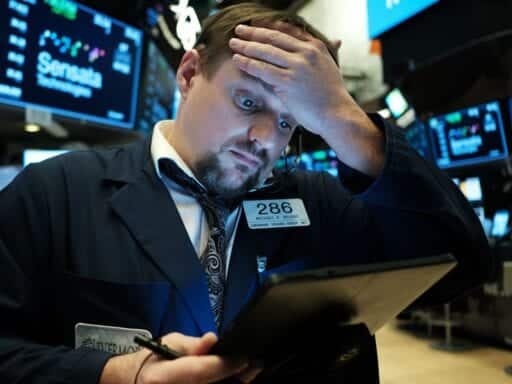Keep in mind long-term goals, and just make sure you’re saving enough.
The sharp downturn in global stock markets over the past 10 days is an alarming warning about the state of the world economy. It also poses some extremely difficult questions for people invested in the stock market who are at or near their retirement.
But for the majority of people who are years or decades away from retiring, nothing about a sharp downturn should scare you off from investing. If anything, the low prices usually mean it’s a more favorable time to buy. That’s not to say you should get obsessed with trying to time the market. But often the worst thing a typical investor can do is sell.
Having stocks on the brain means it’s a good time to take a close look at your household budget and see if it’s at all possible to increase the amount of money you save through a 401(k) or IRA.
The stock market usually goes up
The most important thing to know about the stock market is that while there’s a lot of year-to-year volatility, the general trend is strongly upward.
Over a 20-year period, the US stock market has never gone down. That’s not magic, it simply reflects the fact that the economy tends to grow over time and consequently so do corporate profits. A diverse portfolio of stock gives you ownership of a slice of those profits. While it’s not guaranteed to rise over the long run, if it doesn’t, that’s probably going to be because some cataclysm — a nuclear war destroys the basic infrastructure of American cities or a genuinely apocalyptic epidemic like something out of The Stand — occurred that gave you something bigger to worry about than your retirement fund.
The short-term ups and downs of financial markets are interesting to journalists in part because they provide a kind of real-time indicator of what people think is going to happen in the future. The huge drop in the stock market since the novel coronavirus spread beyond China is a sign that people with money at stake think the world economy is going to tumble into a recession.
At the same time, financial markets are chronic overreactors.
There was one week in October 2008 when the Dow lost 18 percent of its value. The recession that followed was, indeed, really bad, and the policy response from the American government was only partially successful. Nonetheless, despite all the pain and horror of the Great Recession, the actual economy never shrunk by nearly as much as 18 percent. Consequently, during Barack Obama’s first term the stock market actually bounced back much more strongly than the real economy largely because there was never any good reason for it to have fallen so much in the first place.
The coronavirus situation seems very alarming to public health, and there’s good reason to believe it will seriously damage the economy. That said, there’s no reason at all to think that it will have a meaningful impact on the state of the world five or 10 years from now. Whatever happens, the economy will bounce back, and the stock market with it.
A good time to buy low
All of this is because financial markets, famously, tend to very heavily discount the future. Basically, the market cares a lot about the next quarter and the next year, maybe a little about the next five years and not at all about the future beyond that.
You, when planning your own life, should be a little more thoughtful and prudent than that. If you plan to keep working for years or decades, then the only real implication for you is that $100 will buy more shares of stock than it would have a month ago.
To put it in more technical investment terms, the “expected return” on the stock market over the next 20 years has gone up precisely because the market has gone down. When the market has boomed for a while, the odds of an additional boom go down. When it’s had sharp declines, a boom becomes more likely. Don’t take this as investment advice for the next day or week or month — I have no idea if stocks will go up or down from here. But over a multi-decade horizon, the market almost always goes up. If you can get it when it’s low, that’s good.
Most people don’t really save as much money as experts think they should. Saving more is, of course, difficult. But to the extent that the markets being in the news makes you do anything, it should be to check and recheck if there aren’t prudent changes you could be making to put more money away now when it’s most valuable.
By the same token, the declining stock market has also brought interest rates to historic lows meaning it may be possible to do things like get a mortgage and buy a house on more favorable terms than was the case pre-coronavirus.
This sort of dynamic is ultimately part of how economies recover from bad times — prices go down and people swoop in to take advantage of the bargains, which helps push things back up. It’s, of course, not your job to personally bolster the entire investment position of the world economy.
But just as panic is unhelpful in a public health crisis, the mentality of fear induced by a steep decline can itself become an economic problem. The best thing you can do for both yourself and the community is to step back and think things through. Nothing about the dramatic events of March 2020 has really changed anything about how I think the world will look in 2050 when I might be ready to retire.
There’s plenty to worry about in life (like trying to remind yourself to stop touching your face) without losing faith in the entire financial and economic system.
Author: Matthew Yglesias
Read More



